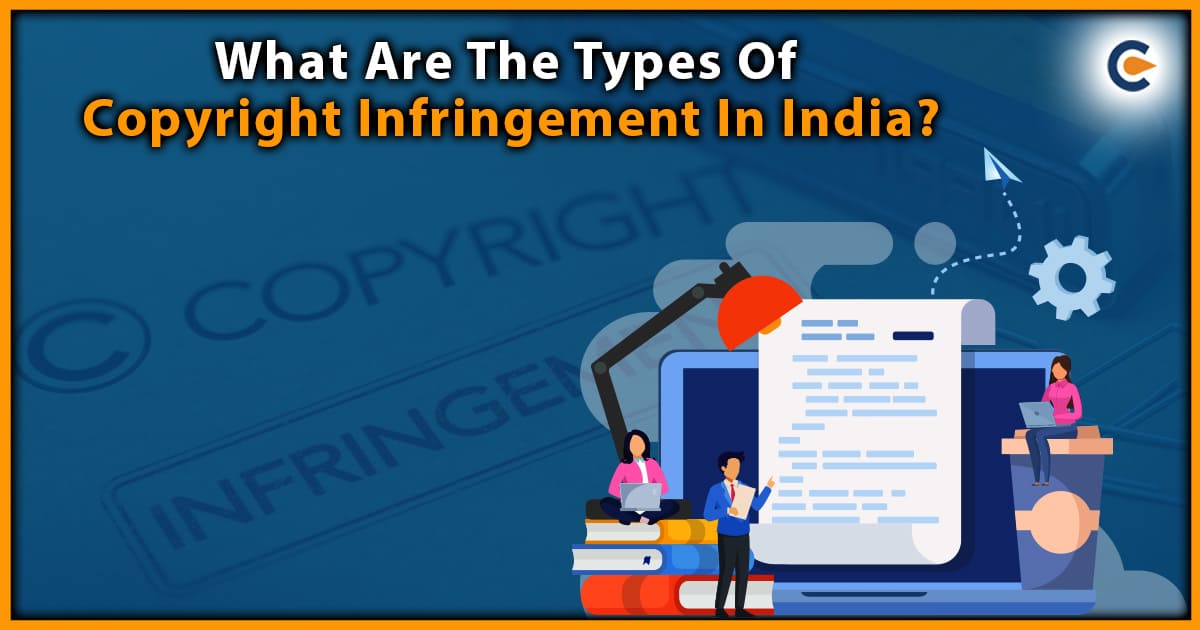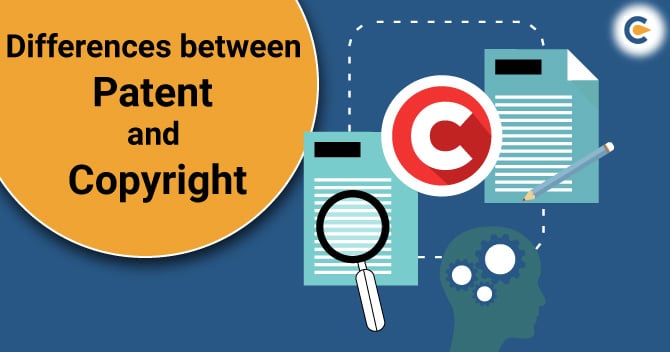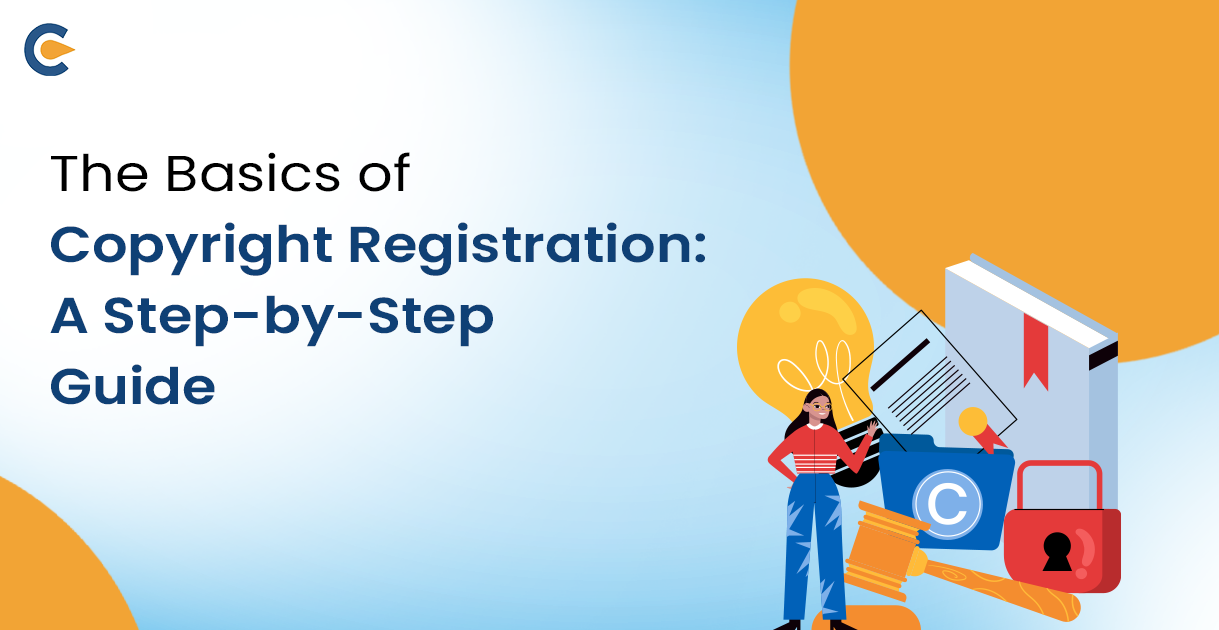With the use of the internet, things have become so accessible in a way that we can find anything on the internet. People copy anything from the internet and present it as their own without realising that it is someone else’s original work. For using someone else’s work, you will be required to take authorisation from the owner of the work. All such acts of copying someone else’s original work come under Copyright Infringement. Moreover, copyright and its infringement are governed by the Copyright Act of 1957[1]. The act determines copyright infringement as a serious offence. In this article, we will discuss about Copyright Infringement and the different types of Copyright Infringement in India.
Unlike a trademark, a copyright is automatically granted once a person produces any original work, and the copyright will be violated as soon a person uses or copies the original work of someone else. The authority and right to use, distribute, reproduce, etc., is available only to the copyright owner. In order to understand better, let’s take an example, the film-maker has the copyright over his film, book writer or author has the copyright over his book.
What is Copyright?
Before we discuss the types of Copyright Infringement, let’s discuss the meaning of Copyright. The term “copyright” describes a group of legal rights of the person who is the creator of the original work or authorship, such as literature, art, music, etc. Only the creator of the original work or the copyright owner has the over the work. Furthermore, he can give access to use or maintain the work to someone else, and only then any other person can use somebody else’s copyrighted work only for the purpose as prescribed.
As per Section 14 of the Copyright Act of 1957, copyright gives the exclusive right to perform or authorise the performance of any of the following actions in relation to a work or any significant portion thereof:
- Any kind of reproduction is permitted, including saving the work in any format.
- Publicise the work and distribute copies of it.
- Execute the Task in Public.
- Create any cinematic Film on the original work.
- Make a translation or an adaption of the work.
Why is there a Need for Copyright?
Due to copyright, the creator of the work gets ownership of his work, and he gets legal protection in respect of his rights. Therefore, no other person can use his work without the copyright owner’s permission. The most important part is that the owner of the work has the right and control over his work, and he can sell, reproduce, and distribute his work as per his choice.
With the help of copyright, your work is also promoted along with your name on it while protecting the owner’s exclusive rights. The copyrighted work provides recognition of the owner of the work. He can also get monetary benefits if his work is sold or distributed, along with certain other incentives and rewards. Copyright also works as an encouragement for the people. It lets them develop new and unique ideas to get recognition in society for their unique and original work.
Copyright Infringement
The unauthorised use of a work protected by copyright is referred to as copyright infringement. Thus, the unauthorised use of someone else’s copyrighted work violates the owner’s rights, such as the right to reproduce, distribute, exhibit, or perform the protected work.
Copyright Violated is specified in Section 51 of the Copyright Act. It states that a copyright violation occurs when:
- Any act that the copyright owner is entitled to perform is performed by any other person without the copyright holder’s consent.
- Unless he was unaware or had no cause to suspect that such consent would result in a breach of copyright, a person authorises using the location for communication, sale, distribution, or display of an infringing work.
- Importing pirated works or copies of original work.
- Without the copyright holder’s permission, someone reproduces his work in any way.
Types of Copyright Infringement
The types of Copyright Infringement can be broadly classified as Primary and Secondary infringement.
Primary Infringement
This is one of the main types of Copyright Infringement, The act of duplicating the copyright holder’s work is referred to as primary infringement. For instance, making copies of books to distribute them for profit. However, a person could copy some part of the original work, like a paragraph from an article, then the Copyright owner is required to prove two things:
- Significant Taking
A copyright violation occurs when an unauthorised individual copies a significant portion of the work. For example, copying a quote or a rhyming line from the whole story.
The court considers how the average person will see the work when making their decision. It is considered plagiarism if the average person says that he has copied the work from any other source.
The court will then verify whether the writing style, mistakes, and vocabulary of both the works are similar or not. If the work is similar, then it will be the proof of violation. The infringement claim will not be affected by the person’s small modifications to a copyright holder’s work.
- Casual Relationship
The copyright owner must demonstrate a resemblance between their works and those of the infringement. This might, however, be for a number of other reasons, such as both people might have referred to a similar source for the purpose of research. In such instances, the copyright owner cannot claim infringement of his copyright.
Secondary Infringement
The term “secondary infringement” describes the violation of copyright without actually reproducing it.
Deciding a Place Where Copyright Infringement Can Take Place
Suppose someone decides on a location and uses it (for profit) for displaying someone else’s work to the public. Such an act of communicating to the public will amount to copyright infringement. In such instances, that person may be held accountable for the crime of copyright infringement. However, the individual cannot be held responsible for copyright infringement if they are ignorant or have no cause to suspect that violation will occur.
It is significant to remember that the person should let the location be held accountable for copyright infringement for “profit”. If an NGO rents out the space, the NGO cannot be held accountable for the situation.
- Selling Unauthorized Copies
If someone else copies and sell the work of the copyright owner, it will amount to copyright infringement.
- Selling Or Distributing Illegal Copies
Copyright infringement occurs when someone distributes illegal copies of works that are already copyrighted in someone else’s name. For example, when someone freely uploads a movie on the internet.
- Importing Illegal Copies
A copyright violation also occurs when an Indian copyright holder imports the infringing work. However, copyright infringement would not have occurred if the offender imported the infringing work for domestic or personal use.
Process of Claiming Ownership of Copyright
After discussing the types of Copyright Infringement, now let’s discuss the process of claiming ownership of Copyright:
- Submission Of Documents
The first step while copyright registration is to provide certain required documents to the copyright office, such as an application form, copies of original work, proof of payment, and an affidavit from the copyright owner stating it is his original work.
- Time Taken For Copyright Registration
Remember that the copyright office typically takes 6 to 8 months to process your copyright application.
- Validity of Copyright Protection
Your original work will be protected under copyright for a period till the life of the copyright owner, plus for 60 more years after his death. Moreover, any copyright taken on behalf of the company will be in force for 60 years from the date of publication.
- Transfer of Copyright Ownership
Copyright ownership can be transferred either by license or assignment in writing after the signature of both parties.
Remedies Available for Copyright Infringement in India
In case of copyright infringement, the following are available for the copyright owner:
- Injunction – The copyright owner can seek remedy from the court to put a stay order on further use of his original work by the other party.
- Damages – The copyright owner is also liable to get compensation for the losses that occurred due to copyright infringement.
- Seize And Destroy The Infringing Copies – The court can also order to seize and destroy the copies that result in infringement of the copyright.
- Share in Profit – The copyright owner can also get a share in the profit of the infringing party earned through copyright infringement.
Copyright Violations Amounting To a Cognizable Offence
An offence that is considered serious enough to require an immediate arrest and in which a police officer does not require a warrant from a magistrate to arrest a person is known as a Cognizable Offence of Copyright Infringement. According to India’s Copyright Act of 1957, copyright infringement is a criminal subject to both imprisonment and monetary damages.
Law enforcement can make an immediate, warrantless arrest where copyright infringement is considered a cognizable violation. This implies that the police have the authority to immediately make an arrest if someone is found to be breaching copyright. According to the Copyright Act, anybody found guilty of copyright infringement may get imprisonment for a term extending up to three years or a fine, or both.
Criminal Punishment for Copyright Violations
For a copyright breach that is deemed criminal, the minimum punishment is six months of imprisonment and a minimum fine of Rs. 50,000. The minimum punishment for a second or subsequent conviction is one year of imprisonment and a Rs. 1,000,000 fine.
A few instances of copyright violations include illegal distribution, public performance, adaptation, and replication. These activities are illegal, and as a result, the infringer can face legal action. In contrast to civil remedies, which include injunctions, damages, and profit accounts, criminal sanctions only include fines and imprisonment. If the owner of the protected content files a complaint, the police are obligated to take action against the perpetrator. The police have the right to seize copies of the infringing work and even prosecute the perpetrator.
Conclusion
At last, the goal of copyright is to preserve the creator’s legal rights while also offering financial incentives. The purview of copyright encompasses all literary or creative works, including computer software and databases. Although registering a work to qualify for copyright protection is not necessary, doing so is frequently encouraged because it can be used as evidence in court.
Read Our Article: What Type Of Works Protected By Copyright In India?











